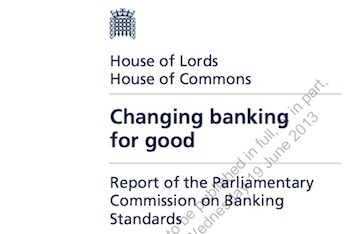Regulators should be given a 'special measures tool' to identify and tackle serious bank failings, according to a new report into banking today.
The Banking Commission, chaired by Andrew Tyrie MP, has produced a report called 'Changing Banking for Good'. The commission was established in July 2012 to following the Libor scandal.
Key points of the report include making senior bankers personally responsible, reforming bank governance, creating more diverse markets and reinforcing the power of the regulator.
Regarding regulation, special measures would take the form of a formal agreement by banks to address the concerns identified by the regulator and may be a precursor to formal enforcement action.
It expected an independent report would be conducted to examine how much the initial concern is an indicator of wider failings.
Mr Tyrie, commission chairman, said: "The recommendations contained in this report- particularly the ability to impose 'special measures' on individual banks where serious failings in standards and culture have been identified- will help empower regulators and provide them with the practical tools they need."
{desktop}{/desktop}{mobile}{/mobile}
The commission accepted twin-peaks regulation had its advantages but questioned whether by focusing on their own objectives, the two bodies would miss systemic weaknesses which created problems in different parts of the business.
Regulators would also need to rely on judgement rather than procedures to assess risk. They would also need to be close enough to businesses to make swift decisions based on up-to-date information rather than belated actions with the benefit of hindsight.
Regulators would be held accountable for their actions, ultimately to Parliament.
Mr Tyrie: "Serious regulatory failure contributed to a decline in banking standards. Regulators tell us they have moved away from the failed box-ticking approach of pre-crisis regulation. I hope so.
"In future they must be a much greater emphasis on judgement and more work by Parliament to ensure that exercise of these regulatory judgement is scrutinised."
• Want to receive a free weekly summary of the best news stories from our website? Just go to home page and submit your name and email address. If you are already logged in you will need to log out to see the e-newsletter sign up. You can then log in again.

